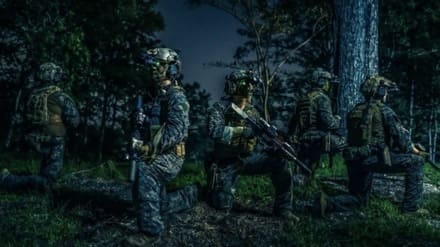The Irregular Warfare Initiative proudly announces the SOF in Competition Project. The intent is to coalesce the community of SOF policy makers, researchers, and practitioners to understand the role of SOF in addressing contemporary and future national security challenges. The project explores the intersection between irregular warfare, SOF, and broader national security challenges. With a focus on current events and their underlying historical logics, scholarly theories and evidence-based findings on the role of SOF in national security, and applied doctrinal concepts — we aim to contextualise the role of SOF in irregular warfare and modern conflict.
SOF Professionals Need an Intellectual Home
Since President George Bush’s declaration of the War on Terror in 2001, Special Operations Forces (SOF) have been focused on combating violent non-state actors to include terrorist groups such as al-Qaeda and ISIS. SOF excelled in the GWOT conflicts, seeing a rise in prestige and national resources as they tackled threats with a high degree of flexibility and effectiveness.
However, the GWOT is over. Western governments are increasingly focused on the return of great power competition. The former focus on countering violent non-state actors coupled with the swift re-introduction of great power competition may have unintentionally dislocated SOF from contemporary deterrence strategies. This rapid shift has led to important questions for the SOF and broader national security communities.
Most pressingly: what role does SOF have in great power competition? However, other questions require attention. How should SOF balance between non-state threats and directly confronting peer competitors? How should SOF capabilities and organization evolve to address changes in the threat landscape and rapidly changing technologies? What is the role of SOF in large-scale combat operations? How should SOF integrate with conventional forces? And many more.
These questions are not without consequence. Some argue SOF is irrelevant in strategic competition, with the U.S. Army going so far as to cut SOF manning and resources. Others argue that SOF will play a larger role in strategic competition, particularly as nuclear armed great powers historically have sought to attack each other indirectly through proxy conflicts – where SOF play a key role. Force postures are being resourced and doctrine is being revised based on these competing perspectives.
The SOF in Competition Project will provide a space for the community of SOF professionals – researchers and practitioners – to explore and address the big questions. This space is needed so we can grow as a profession, build professional networks, and contribute to advancing western national security interests.
The SOF in Competition Project aims to understand SOF’s value proposition in great power competition. It will serve as a rally point for various SOF stakeholders to convene, network, drive public dialogue, and advance our understanding of SOF in areas range from phase zero operations, to SOF’s role in deterrence, to understanding the role of SOF in continuing to address persistent non-state actor threats — and beyond.
Call to Action
The SOF in Competition Project provides a platform for this community to coalesce, understand the role of SOF, and invest in leaders and the broader community. If you are a SOF professional, this is your platform. We very much welcome article submissions, ideas for events and partnerships, podcast topics, and volunteers to join the community. Reach out to the authors to understand how you can get involved.
The need for this dialogue is real and growing!
The consequences are real!
We look forward to building this community together!
We invite your participation and engagement as we embark on this project.
If you would like to contribute to the SOF Special Project, please submit proposals to:
[email protected] with the subject line “Project SOF Submission/ Proposal”.
– Director Adam “Monster” Darnley-Stuart
You can skip to the end and leave a response. Pinging is currently not allowed.
Read the full article here








Leave a Reply